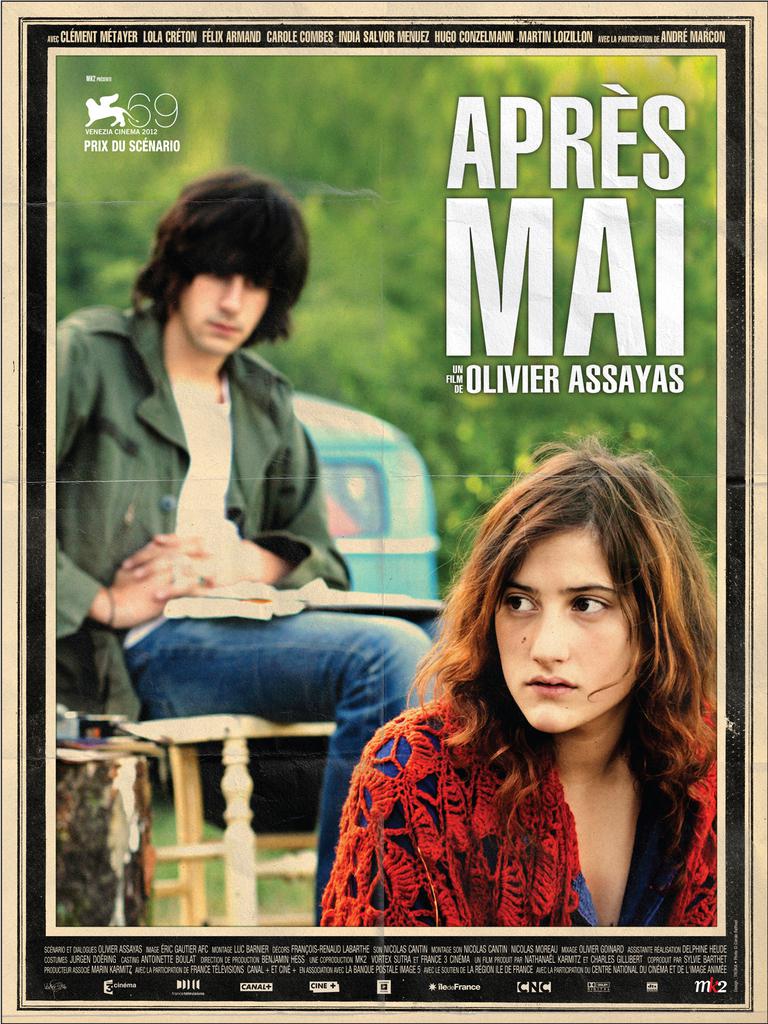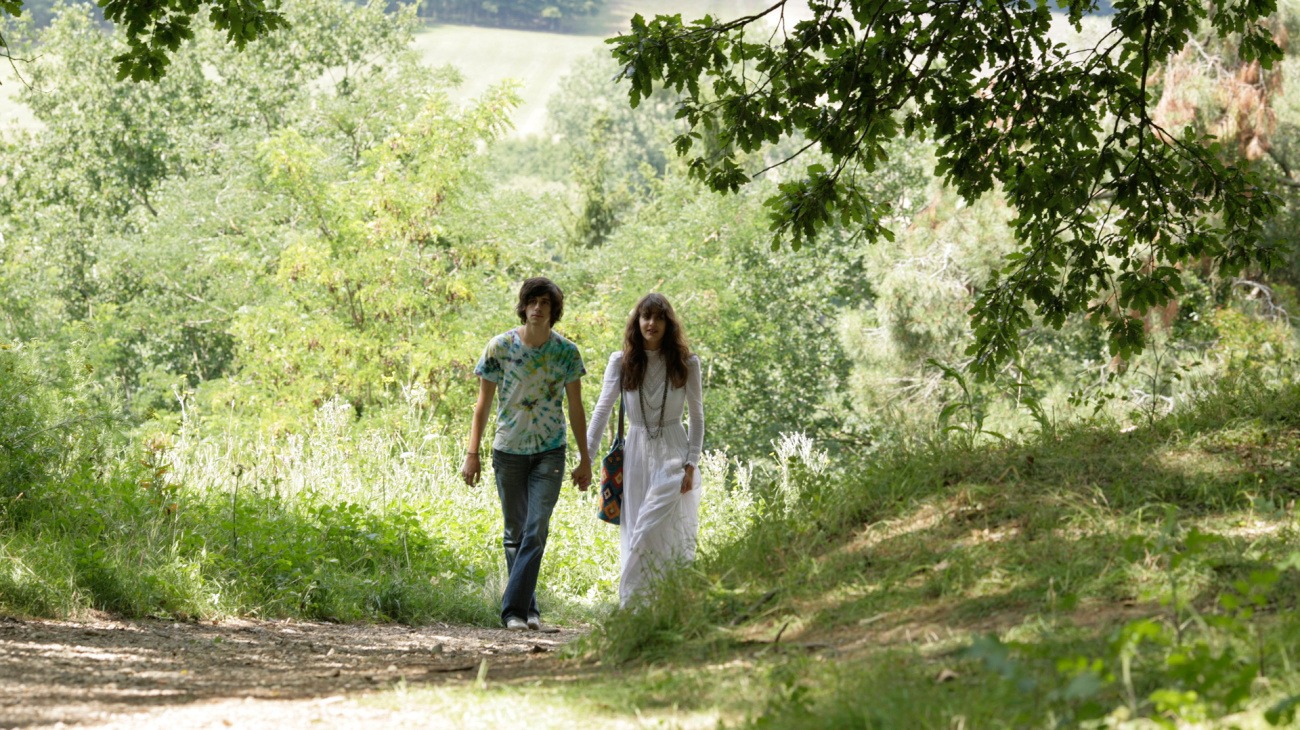
The 48th Chicago International Film Festival
The original French title of the film Something in the Air is Après mai, "After May", and a vastly more descriptive title it is, too. Because the film, an autobiographical work of sorts for Olivier Assayas, is very much set in the aftermath of May, 1968, a month that has only tangential importance for most Americans, but is one of the defining moments in the history of post-WWII Europe: the month when all of the growing uncertainty and resentment and revolutionary fervor of the period exploded, in multiple countries, leading to a spirit of real social radicalism lightyears away from the gentler American revolutions of the period, which were about peace and understanding and so much sex and drugs. And not as much of the anxious desire among young people to actually, literally, change the government and society in which they lived, democratically if possible, and if not...
And so, "after May" - as in, what can the young radical become in the days after 1968? It is a question asked in the film by several teenagers in 1971, their last year of high school outside Paris, and answered differently by all of them: some want to continue fighting the fight, some want to be seen fighting the fight, in order to curry approval; some want to change the world through other, less overtly political means, some want to simply live their life as best they can and be done with all the radicalism that seemed like such a good idea at the time, but has grown increasingly uncomfortable as it gets more serious.
The main figure we follow grappling with these questions is Gilles (Clément Métayer), an aspiring artist, the son of a television producer, who starts the film off in a moment of low-key teenager crisis, when Laure (Carole Combes), the girl from another town that he's been seeing, gently but definitively calls things off (not definitively enough for the boy, who ends up needing to have it spelled out later), putting him in a position where he has nothing to fill his hours but to redouble his commitment to the student revolutionary group that he's part of; and as things will do, this turns into him hooking up with fellow revolutionary Christine (Lola Créton), among other misadventures and squabbles with the authorities that end up sending the two of them, as well as follow activist Alain (Felix Armand), for a trip to Italy to let things cool down over the summer.
There's been no lack in recent years of movies about the tribulations of young radicals in the early '70s, finding their way either to self-destructive deeper commitment to their ideals, or to the disillusionment that allows them to survive while feeling empty and pointless (and since this is largely a European genre; no there are none of them that end with contentment and emotional fulfillment), owing perhaps to the ascension to the front ranks of world filmmakers people whose formative years were right in that span (Assayas was 16 in the year that his movie opens). And, judged solely on the level of reportage, Something in the Air does not bring anything new to the table, though Assayas's eye for detail both in visual and character elements to the milieu depicting does give it the casual force of at least seeming accuracy that is absent in some of these films.
More importantly, Assayas's characteristic antipathy towards over-romanticising anything keeps Something in the Air from falling into the trap of seemingly every other depiction of student radicals in the past several years: it doesn't blithely endorse every little thing they do or say, secure in the knowledge that four decades later, sentimentalising the radicals doesn't have any actual social meaning one way or the other. The film's dominant mode is complete neutrality: it neither praises nor condemns the students for their beliefs - which are largely left unarticulated, and while we can assume that they're generically "left wing", it's not clear that the kids are sophisticated enough to have much more of an idea what they're fighting for than we are - and prefers instead to work as a character study of people swept up in a social epoch and revolutionary mindset, than a study of that epoch or that mindset.
And as character studies go, it's a good one: Métayer (like most of his castmates, a first-timer) gives a tremendously appealing lead performance of a young man finding his way, knowing that what he wants (to be an artist, to fall in love) is difficult to square with what he'd like to want (a bold new world of equality), and the fluctuations through the movie in exactly how much commitment he has to idealism versus how pragmatic he wants to be in his day-to-day life is the heart and soul of the movie.
Most of the people surrounding him, it must be confessed, aren't quite as interesting, either to the actors playing them with only modest distinction, or, apparently, to Assayas himself, who is working in a distinctly minor key here - despite some gliding, Renoirish camera moves around the locations early in the movie, giving us a clear sense of how these lives are lived, it's one of the most visually undistinguished things he's ever made - and does not foreground any of the characters or performances beyond the one based, in a vague and indirect way, on himself.
There are no two ways about it: this isn't a vital film. Assayas himself covered much the same territory (the political unrest of the 1970s) to incomparably better effect in the epic Carlos in 2010, and at no point is the treatment of the scenario so blindingly incisive that it justifies itself in any absolute terms. It's fine; a fine movie that tells an interesting story in a clear way and bases itself on a likeable protagonist, and never rises to the level of greatness. It would be easier to like this movie with a different director, I think; one who hadn't proven himself so ingenious, so often, and from whom a satisfying but ultimately basic film like this one wouldn't feel so lazy and slight.
And so, "after May" - as in, what can the young radical become in the days after 1968? It is a question asked in the film by several teenagers in 1971, their last year of high school outside Paris, and answered differently by all of them: some want to continue fighting the fight, some want to be seen fighting the fight, in order to curry approval; some want to change the world through other, less overtly political means, some want to simply live their life as best they can and be done with all the radicalism that seemed like such a good idea at the time, but has grown increasingly uncomfortable as it gets more serious.
The main figure we follow grappling with these questions is Gilles (Clément Métayer), an aspiring artist, the son of a television producer, who starts the film off in a moment of low-key teenager crisis, when Laure (Carole Combes), the girl from another town that he's been seeing, gently but definitively calls things off (not definitively enough for the boy, who ends up needing to have it spelled out later), putting him in a position where he has nothing to fill his hours but to redouble his commitment to the student revolutionary group that he's part of; and as things will do, this turns into him hooking up with fellow revolutionary Christine (Lola Créton), among other misadventures and squabbles with the authorities that end up sending the two of them, as well as follow activist Alain (Felix Armand), for a trip to Italy to let things cool down over the summer.
There's been no lack in recent years of movies about the tribulations of young radicals in the early '70s, finding their way either to self-destructive deeper commitment to their ideals, or to the disillusionment that allows them to survive while feeling empty and pointless (and since this is largely a European genre; no there are none of them that end with contentment and emotional fulfillment), owing perhaps to the ascension to the front ranks of world filmmakers people whose formative years were right in that span (Assayas was 16 in the year that his movie opens). And, judged solely on the level of reportage, Something in the Air does not bring anything new to the table, though Assayas's eye for detail both in visual and character elements to the milieu depicting does give it the casual force of at least seeming accuracy that is absent in some of these films.
More importantly, Assayas's characteristic antipathy towards over-romanticising anything keeps Something in the Air from falling into the trap of seemingly every other depiction of student radicals in the past several years: it doesn't blithely endorse every little thing they do or say, secure in the knowledge that four decades later, sentimentalising the radicals doesn't have any actual social meaning one way or the other. The film's dominant mode is complete neutrality: it neither praises nor condemns the students for their beliefs - which are largely left unarticulated, and while we can assume that they're generically "left wing", it's not clear that the kids are sophisticated enough to have much more of an idea what they're fighting for than we are - and prefers instead to work as a character study of people swept up in a social epoch and revolutionary mindset, than a study of that epoch or that mindset.
And as character studies go, it's a good one: Métayer (like most of his castmates, a first-timer) gives a tremendously appealing lead performance of a young man finding his way, knowing that what he wants (to be an artist, to fall in love) is difficult to square with what he'd like to want (a bold new world of equality), and the fluctuations through the movie in exactly how much commitment he has to idealism versus how pragmatic he wants to be in his day-to-day life is the heart and soul of the movie.
Most of the people surrounding him, it must be confessed, aren't quite as interesting, either to the actors playing them with only modest distinction, or, apparently, to Assayas himself, who is working in a distinctly minor key here - despite some gliding, Renoirish camera moves around the locations early in the movie, giving us a clear sense of how these lives are lived, it's one of the most visually undistinguished things he's ever made - and does not foreground any of the characters or performances beyond the one based, in a vague and indirect way, on himself.
There are no two ways about it: this isn't a vital film. Assayas himself covered much the same territory (the political unrest of the 1970s) to incomparably better effect in the epic Carlos in 2010, and at no point is the treatment of the scenario so blindingly incisive that it justifies itself in any absolute terms. It's fine; a fine movie that tells an interesting story in a clear way and bases itself on a likeable protagonist, and never rises to the level of greatness. It would be easier to like this movie with a different director, I think; one who hadn't proven himself so ingenious, so often, and from whom a satisfying but ultimately basic film like this one wouldn't feel so lazy and slight.






